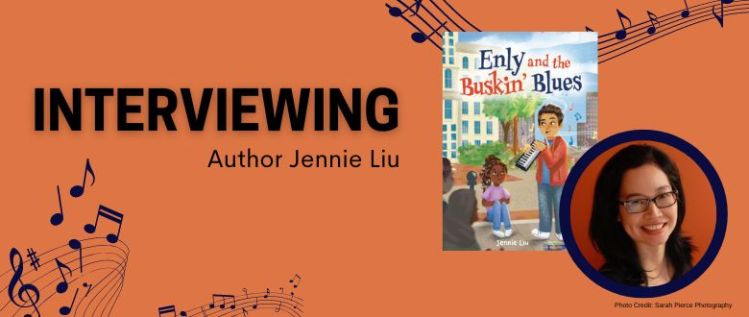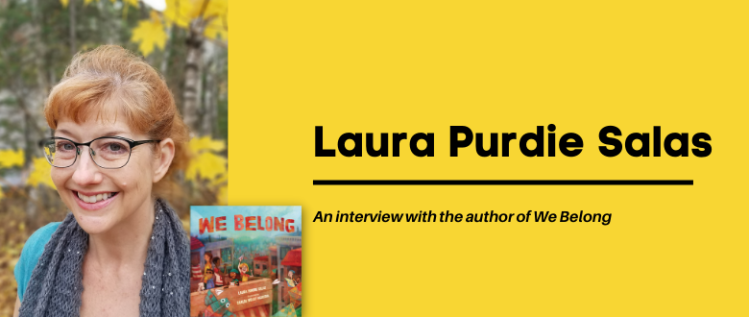Enly and the Buskin’ Blues: An Interview with Author Jennie Liu

Meet Enly Wu Lewis, aspiring musician. He’s determined to go to band camp, but with his mother working two jobs and saving every penny for his older brother’s college tuition, he’s going to have to earn enough money himself. Enly decides to earn money busking on the streets of Altamont, but a series of misadventures upend his plans.
Author Jennie Liu joins us today to discuss writing Enly and the Buskin’ Blues. Read on to find the free downloadable discussion guide!

What was your inspiration for the book?
Enly and the Buskin’ Blues is a love letter to my community. When I was growing up, my parents moved around every few years trying to get established. (Also, as Chinese immigrants in a predominantly white community, my parents kept us close to home.) I never really felt like part of a community until I came to Asheville. Even then it took many, many years. My husband is a native here and I was always awed by how invested he was in the changes happening to the town, especially the negative things. I’m so glad my kids are going to grow up in one place.
This book started when my son Eliot told me he wanted to use his Chinese New Year money to buy an accordion so he could busk downtown. Apparently his Spanish teacher had brought hers to school to play for her students. In sort of a flash, I saw how I could pull together some of the elements and issues that had been in the back of my mind about my town. I was also looking to write a fun story at my son’s request. I tend to bring home books for my kids that deal with struggle or social issues (because that’s what I like to read), which my kids have always thoughtfully read if I recommend.
But recently, my one son has noticed this was a trend with me and asked me why I didn’t bring home more fun books. (In my defense, I do bring plenty of those around too! They just devour them much more quickly.) When my kids were really young, one of our children’s librarians said to me, “There are books that kids want to read, and there are books that parents, teachers, and librarians want their kids to read.” That has really stuck with me.
What are some other examples of real-life inspiration from your community that made it into the novel?
Buskers for sure; neighbors being pushed out of rentals to be sold or Airbnb’d; buying lottery tickets at the local pharmacy; a pet Vietnamese potbelly pig in the neighborhood; an overtired mom straddling benign neglect and tiger-ing expectations; elderly people and people experiencing homelessness hanging out on the sidewalk benches; affordable housing apartments for the elderly; cops on bikes; the pawn shop with musical instruments crowding the window; even the name Altamont, which comes from the town in Look Homeward, Angel, by Thomas Wolfe, Asheville’s own native-son writer.

What about the negative aspects of community? Are they explored in the novel?
Our neighborhood was considered “sketchy” when my husband moved into it. Now it’s absolutely unaffordable. There’s a small apartment complex across the street that used to be affordable. A classmate of my son lived there, but a few months before I started writing this story, her mom told me they had to move because the building had been sold and was going to be renovated into much more expensive units. They were given thirty days to move. The four of them were going to have to move in with the mom’s grandmother. That was about the fifth person I knew who’d had to move or who couldn’t find affordable housing within the past few years—despite having lived here for a really long time. Two of them were teachers!
Our town has changed a lot, especially in the last ten years or so. Gentrification and development have exploded. Besides a lack of affordable housing, there are tourists all over the place and many, many more people experiencing homelessness. But after writing two “heavy” stories, I was looking to write a fun read, particularly something that might engage boys, so I tried to keep a light hand on the negative things. I do touch on those aspects: Enly’s family has a lower income, and he becomes more conscious of disparities over the course of the story. But overall I wanted the story to be more of a caper.
Are there things you idealize about community in the novel?
The cross-generational, -economic, -racial, and even inter-gender friendships in the novel were intentional, because wouldn’t it be great for our kids to be exposed to more of that? As kids get older they become more self-focused and seem to drift into self-segregated groups. I think it’s important to have more stories and media where diverse relationships and sensitivity to others are present and normalized.
How does Enly’s ethnic identity play into the story?
I wanted to write a story where racial identity wasn’t the character’s main focus or “problem.” I think that’s one of wonderful upward steps in representation and normalizing diversity—a character who happens to be BIPOC or mixed, because the world is mixing, is at the center of a caper, mystery, romance or whatever dilemma. Of course we all come from somewhere and our backgrounds do have a way of working their way into our beings.
Enly is mixed second-generation Chinese American (and white), and his family is of lower income, which I think is the bigger element of his identity in the story. His family isn’t struggling so much that he doesn’t have his basic needs met. But when he really wants something, he has to work for it, and he begins to become conscious of income disparities and understand his mom’s preoccupation with security.

You’ve mentioned that your boys helped in the writing of the story. Can you talk about some specific ways they helped you?
This was the most fun to write because of that. Of course I pulled bits from their lives, and some scenes were inspired by little incidents they told me about. But as I was writing, I would also toss out ideas for the storyline and watch what they laughed at or wrinkled their noses at. They were both brutal when it came to language that wouldn’t be used by kids and some scenes that they thought needed to be tossed. They read several drafts.
I also remember being stuck at times as to what should happen, and they would half listen. Then later, at an odd time like when he’d just come in through the door or was watching TV, my younger one would absently say, “You should have Enly do such and such.” My younger son also went around with me to buy and scratch lottery tickets, visit the pawn shop, and talk to buskers. He had lots of general advice, such as not to make the story too sentimental or depressing (like many of the books that I bring home and leave around for him). As I was developing the Dad part of the story, he cautioned me to not go “too Coco” with it. Apparently in the Disney movie Coco, the main character wants to be a musician but the family tries to prevent him because of some family legacy. I think he saw the direction of the novel as more in the vein of Diary of the Wimpy Kid.
What about the character’s name?
Oh! My son also named the character. I think he just made it up. His name is Eliot so I think he subconsciously (or maybe not so subconsciously) wanted an E name that reflected a little on himself. I wasn’t wild about the name at first but used it as a working name. I told my son we would leave it unless my agent or editor suggested a change, which I was sure they would, but they did not. Later, when one of my young beta readers thought Enly was a girl through the whole reading of the story, I realized that wasn’t really a problem—it was sort of nice that he read it that way.
Free Educator Resource
Download this free discussion guide for Enly and the Buskin’ Blues to engage your readers in rich conversation!
Praise for Enly and the Buskin’ Blues
“A quick-paced coming-of-age story exploring music and family expectations.”—Kirkus Reviews
“This fast and furious plot will have readers alternately cringing and cheering at Enly’s impulsiveness, fully invested in this protagonist’s success. While the tone is light, some serious issues are gently explored: gentrification, grief, wealth and lack of it, family ties, and friendship.”—School Library Journal
“A fast-paced, quirky caper with an authentic middle-grade voice.”—Alan Gratz, New York Times bestselling author
Connect with Jennie

Jennie Liu is the daughter of Chinese immigrants and a longtime resident of Asheville, North Carolina, where she lives with her husband and two children. She is also the author of the young adult novels Girls on the Line and Like Spilled Water.
Meet more amazing authors and illustrators on the Lerner blog.


Comments